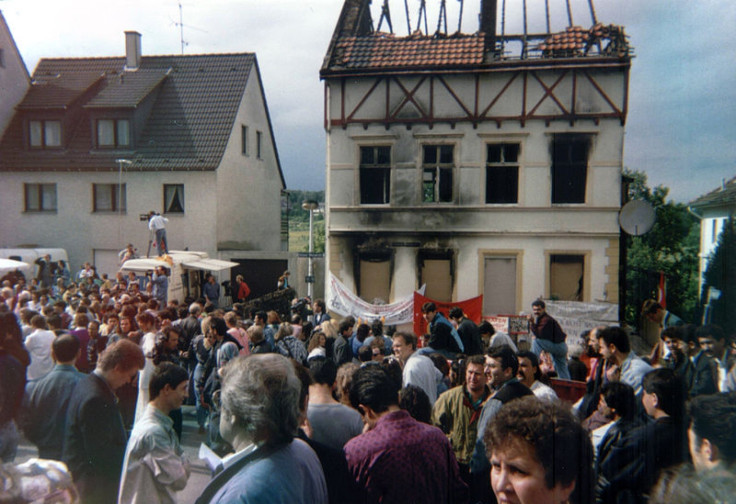Solingen: 20 Years After Neo-Nazis Killed Five Turkish Girls, Integration In Germany Remains Elusive

Twenty years ago Germany witnessed one of the worst racially-motivated attacks on immigrants in Europe of the late 20th century. On May 28-29, 1993, in the town of Solingen in North Rhine-Westphalia in northeastern Germany, four German Neo-Nazi youths set fire to a house that killed five people (three girls and two women) and wounded another 15. All the victims were Turkish immigrants or their descendants.
After a series of violent protest demonstrations by both Turks and Germans across the country expressing outrage over the attack and hand-wringing by politicians, the perpetrators were ultimately convicted of arson and murder in October 1995, resulting in prison terms of up to 15 years.
The defendants were all between the ages of 16 and 23 when they committed the deadly arson -- the relatively modest prison sentences arose partially due to the young ages of the convicts. Moreover, two of the arsonists were released early from prison due to “good behavior.”
The surviving members of the Turkish family sued for damages and received a financial settlement, while senior government officials (with the notable absence of Chancellor Helmut Kohl) attended memorial services for the victims.
During the time of the Solingen atrocity, Turks, numbering at least 2 million, had lived in Germany for more than three decades -- originally invited by the Bonn government (the capital of then West Germany) as "gastar-beiter" (or "guest-workers").
However, in the wake of German reunification, and the attendant economic problems related to sudden political integration, foreigners became scapegoats for many frustrated Germans, particularly working-class youths without jobs or education who became enamored with Nazi ideology.
Between 1988 and 1992, Germany endured a wave of violent assaults on immigrants, leading to the banning of neo-Nazi groups the year prior to Solingen. Nonetheless, by May 1993, in response to growing unease over large numbers of immigrants and asylum-seekers already in the country, Germany's parliament, the Bundestag, passed a law to restrict the entry of refugees.
Now, two decades later, the influx of immigrants, refugees and asylum-seekers continues to create stress and conflict across Western Europe, exacerbated by the economic climate on the continent. But Germany, given the shadows of the Third Reich, appears to be willing to acknowledge that immigration and integration has been extremely painful and difficult.
Last week, German and Turkish officials, including Integration Minister Maria Bohmer and Turkey Deputy Prime Minister Bekir Bozdag, attended a 20th-anniversary memorial ceremony in Solingen. At the memorial, Bohmer declared: “We will not cease in the fight against right-wing extremism and racism.”
At the Solingen memorial, Mevlüde Genc, the matriarch of the family who lost two daughters, two grandchildren and a niece in the arson attack, pleaded: "Let's live together in peace and shape the future together so something like this never happens again."
However, as Germany's Deutsche-Welle news agency reported, xenophobia remains pervasive in Solingen, where the victimized Turkish family, the Gencs, still reside. Another Turkish resident of Solingen, Secil Cakici, who has lived in Germany for 46 years, told DW: "It could have been me. [But] you can't live in fear for long," referring to the arson attack.
Such killings of foreigners in Germany have not ended. Indeed, German media has been covering the trial of three members of the neo-Nazi National Socialist Underground (NSU), who allegedly murdered 10 people – mostly Turks and Greeks – over a decade-long bloodletting.
"How safe can I feel in my own country?" asked Ayla Uzun, a Turkish woman in Solingen. "I can't ... change my name in order to be accepted in this country." She cited her son's difficulties in finding a job as an example of discrimination that Turks still encounter in Germany. "My son applied for jobs after he finished his studies,” she said. “But every time he got a rejection. Then he gave a German name, and he was immediately invited for an interview."
In a bizarre aside to the Solingen tragedy, a leading Jewish official in the U.S. told Turkish media that right after the arson attack, he was assured by German diplomats that Jews were not the ones targeted. David Harris, the executive director of the American-Jewish Committee (AJC), said in New York that: “The German diplomats in the U.S. immediately called our institution. I talked to him [one of the diplomats]. He told us, ‘Please don't worry. There are not anti-Semitic attacks. A home of a Turkish family was attacked.'”
Baffled, Harris responded: “Mr. Diplomat, you don't understand. If five Turkish women can be killed only because they are Muslim -- they are ‘other': they dress differently, they talk differently and they eat differently -- then who is safe?”
Indeed, since Solingen, a number of suspicious fires have ravaged the homes of Turks. As recently as March 2013, a fire at an apartment building in Backnang in southwest Germany left eight Turks dead, including seven children. In August 2012, a fire in an apartment in Dortmund killed three Turkish children.
Turks have fared the worst among immigrant groups in Germany. A study released in 2009 by the Berlin Institute for Population and Development indicated that Turks, despite having lived in Germany for 50 years, remain largely unassimilated, poorly educated and live outside the German mainstream.
"We invited the guest workers and thought they would leave again soon," said Reiner Klingholz, the head of the Berlin Institute, according to Der Spiegel. "For too long we were used to the fact that we have primary school classes where 80 percent of children can't speak German.”
But Germany’s then-Interior Minister Wolfgang Schäuble countered that Turks had to make more of an effort to assimilate. "Integration also requires people to take a decision. They have to want to integrate themselves," he said.
© Copyright IBTimes 2024. All rights reserved.











